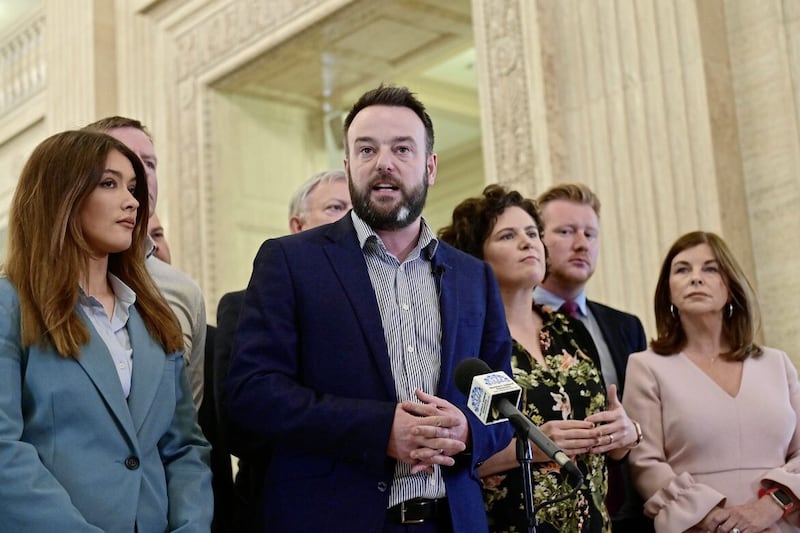LABOUR and Conservative activists in Britain share a loathing of the Liberal Democrats that runs deeper than electoral rivalry. The smaller party has a long record of ruthlessness on the campaign trail and in local government, yet voters still usually credit it as a nice, centrist ‘none of the above’ option.
To its opponents, this is infuriating cakeism. It is hard not to see a parallel in the increasingly bad blood between Alliance and the SDLP.
Alliance and the Liberal Democrats are sister parties, a closer arrangement than often realised, and both know how to fight their corner. But what really brings the parallel home is the SDLP’s evolving critique of Alliance as a party that insults nationalists and unionists alike, by implying true moderates rise above constitutional politics.
Matthew O’Toole, the SDLP’s leader at Stormont, has been a vocal proponent of this objection, insisting it should never be considered immoderate or illiberal to take a constitutional position.
Last week, he said Alliance’s stance of neutrality is “a project to reinforce – rather than transcend – crude sectarian binaries to their political advantage”.
Read more:
- Newton Emerson: Has the SDLP given up on Stormont?
- Newton Emerson: Competence or culture war? The DUP's dilemma
- There's no plan to deal with the mess the DUP has created - Brian Feeney
However, as in Britain, raging against the centrists as the real extremists is an arcane political argument that makes no sense to the electorate. Most voters see the SDLP, UUP and Alliance as natural partners in the centre, with Alliance at the very centre. Angry attacks on it by the SDLP seem as ridiculous as a fist-fight at a dinner party.
Crucially, unlike in Britain, proportional representation and power-sharing reward a partnership of the centre – Stormont’s rules were designed to encourage it, before their re-write at St Andrews.
England and Wales use first-past-the-post for council as well as Westminster elections, so the Tories, Labour and Lib Dems are fighting for every vote in almost every contest.
By contrast, Northern Ireland’s centre parties support each other through transfers in assembly and council elections. They are only in winner-takes-all competition in two or three Westminster seats and even then the UUP and SDLP take no votes off each other.
The SDLP gains most from this arrangement: in last year’s assembly election, it received over 11,000 transfers from Alliance, more than from any other party and equivalent to 15 per cent of its first preferences, helping win two of its eight seats.

This would have been the largest transfer between any two parties, had it not been for the freakish transfer of TUV votes to the DUP.
The UUP got fewer than 900 Alliance transfers, a difference that should be treated with caution, as transfers are a complicated fraction of lower-preference votes. Nevertheless, nationalists tend to see it as evidence that Alliance is taking first preferences from the SDLP and Sinn Féin. In reality, Alliance’s growth is driven by new voters – it is luring people off the sofa, who then transfer to the SDLP, effectively expanding the nationalist electorate.
Nationalism may be gaining more from this effect than unionism because Alliance is concentrated in unionist-majority areas, where soft nationalists might otherwise see no point in voting. The hostility some unionists have stirred up against Alliance since the flag protests must also be a factor.
Read more:
- The route to a border poll goes through Naomi Long - David McCann
- Direct rule would be calamitous for unionism and Northern Ireland - Alex Kane
- Brian Feeney: This place is in terminal decline and soon we'll realise that nothing works
For the SDLP to start signalling its own hostility to Naomi Long’s party looks like a bizarre strategic error, alienating itself from its only significant source of new support.
Although the SDLP’s immediate future lies in its enforced role as Stormont’s opposition, no party wants to be in opposition forever. The SDLP’s long-term future depends on presenting itself, the UUP and Alliance as an alternative to the DUP and Sinn Féin, matching the clear expectations of centre-ground voters. This centre bloc does not require anything as cohesive as a common platform but its parties must at least be on civil terms.
The SDLP missed its chance to form such a bloc without Alliance in 2016, when it spurned former UUP leader Mike Nesbitt’s admittedly hapless offer to ‘Vote Mike, Get Colum’. Today, the slogan would have to be ‘Vote Colum, get Doug and Naomi’.
If the SDLP passes up that chance, Northern Ireland will move to a three-party system where Alliance holds the balance of power on its own, indefinitely.









